The Lady from Shanghai Blu-ray Movie
HomeThe Lady from Shanghai Blu-ray Movie 
TCM Vault Collection / Blu-ray + DVDSony Pictures | 1947 | 88 min | Not rated | Jan 27, 2014
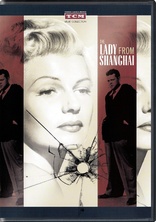
Price
Movie rating
7.7 | / 10 |
Blu-ray rating
| Users | 5.0 | |
| Reviewer | 3.5 | |
| Overall | 3.8 |
Overview
The Lady from Shanghai (1947)
When unemployed Irishman Michael O'Hara saves Elsa Bannister from thugs, she obtains him a position on her invalid lawyer husband Arthur's yacht, as a deckhand. It soon becomes clear that Elsa has designs on O'Hara, and also wants her husband out of the way.
Starring: Rita Hayworth, Orson Welles, Everett Sloane, Glenn Anders, Ted de CorsiaDirector: Orson Welles
| Film-Noir | Uncertain |
| Mystery | Uncertain |
| Dark humor | Uncertain |
| Crime | Uncertain |
| Thriller | Uncertain |
Specifications
Video
Video codec: VC-1
Video resolution: 1080p
Aspect ratio: 1.37:1
Original aspect ratio: 1.37:1
Audio
English: Dolby Digital Mono
Subtitles
None
Discs
25GB Blu-ray Disc
Two-disc set (1 BD, 1 DVD)
DVD copy
Packaging
Slipcover in original pressing
Playback
Region A (B, C untested)
Review
Rating summary
| Movie | 4.0 | |
| Video | 4.0 | |
| Audio | 3.0 | |
| Extras | 3.0 | |
| Overall | 3.5 |
The Lady from Shanghai Blu-ray Movie Review
That was no lady, that was his wife.
Reviewed by Jeffrey Kauffman February 1, 2014Orson Welles. The name just sits there: immutable, unapproachable, yet also unavoidable. Is there any other name in cinema which evokes such a mixture of awe and despair? Welles, the enfant terrible who burst upon the film scene with Citizen Kane, which is still considered by many to be the finest film ever made. Welles, who with that film offended the sensibilities not only of powerful opinion shapers but also (perhaps even more perilously) those within the film industry. Welles, who then quickly saw his career hobbled by interlopers who repeatedly wrested control of his projects from him, remaking them in their own preconceived images of what they deemed to be more “appropriate”. The Lady from Shanghai represents what is arguably Welles’ last attempt to work within (what Welles considered) the confines of the so-called studio system. Though he was estranged from her at the time, his soon to be ex-wife Rita Hayworth agreed to star in a hastily put together Welles project, which Welles himself wanted to do only to raise funds to help pay debts associated with his stage production, a gargantuan musical version of Around the World in 80 Days. (The show’s producer, one Mike Todd, would go on to produce an all star, big budget film adaptation a decade or so later, sans the song score.) Welles, who of course was one of the world’s great raconteurs, insisted (according to the commentary by Peter Bogdanovich included on this Blu-ray as a supplement) that he came up with the idea on the spot, after phoning Harry Cohn (head of Columbia, where Hayworth was under contract) to raise money, and seeing a nearby paperback book stand in front of the phone booth. Welles, according to this perhaps fanciful “memory” (especially since it doesn't exactly jibe with other accounts of how this project got underway), simply chose one of the books from the display and insisted to Cohn that it was a hot property and that Welles would do the film for $50,000 (not so coincidentally the exact amount he needed to pay for the stage show’s costumes). Whether or not this is actually how the project was born is at least somewhat debatable, but it set Welles up to work on a relatively high budget and high visibility project for one of Hollywood’s major studios, something he would never again quite achieve after this film, with the possible exception of Touch of Evil, which was shot on nothing approaching the budget Welles enjoyed with The Lady from Shanghai.
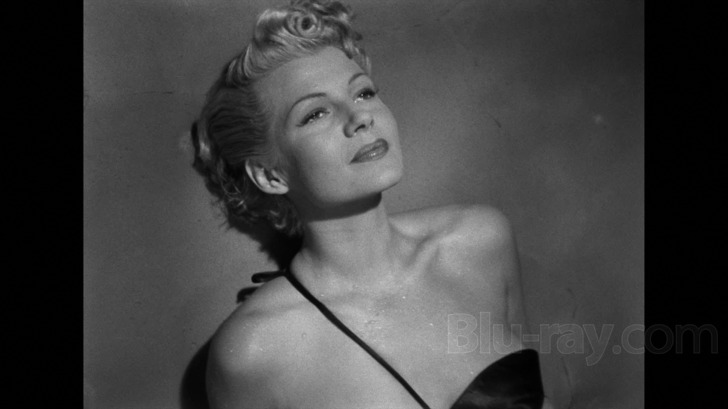
The Lady from Shanghai exploits one of the all time classic noir tropes by positing an irresistible femme fatale who leads a hapless schmuck down the garden path toward what is usually his own destruction. In this particular case, Welles takes a few detour paths through the weeds—literally, in the film’s opening sequence, when Welles’ character Michael O’Hara rescues lovely blonde Elsa (Rita Hayworth) from some toughs in Central Park. There are obviously sparks between the two, even though Elsa is married to crippled attorney Arthur Bannister (Everett Sloane). When it turns out Michael has a sailing background, both Bannister and Elsa encourage him to tag along on the Bannisters’ yacht as a kind of bosun.
At this point The Lady from Shanghai begins a rather perilous journey into competing murder plots and various shifting allegiances. Bannister’s sweaty partner George Grisby (Glenn Anders, whom Welles seems to delight in filming in extreme close-up) ultimately shows up for the ride and he proposes to Michael that Michael should help Grisby fake his own death, which will result in a handsome payday for Michael, allowing him to take off with Elsa. What’s really going on is of course considerably more complex, and Michael soon finds himself ensnared in an increasingly complex web of deceit.
A lot of analysts through the years have claimed that The Lady from Shanghai doesn’t make any sense, a result of massive reshoots and ultimate devastating edits ordered by Harry Cohn after Welles had wrapped principal photography. While the film is incredibly dense and no doubt over convoluted, it does make sense—maybe not much, but there is a through line that can be followed with a little effort. The film repeatedly utilizes fish motifs, referring to sharks in several instances and in one case (courtesy of O’Hara’s voiceover narration), mentioning that our would-be hero has been “hooked” himself, and that can provide a worthwhile key to unlock some of the film’s more recondite plot points. Elsa, Bannister and Grisby are indeed all sharks circling each other, waiting for one of them to falter for a moment so that a kill can be made. Things are further complicated by a supporting character named Broome (Ted de Corsia), who initially is identified as an employee of the Bannisters, but who turns out to have a secret agenda of his own. Broome might be thought of as the chum in the middle of the circling predators, leading to their feeding frenzy. In this formulation, O'Hara might be thought of as some poor swimmer who is simply swept into the maelstrom by the resulting whirlpool.
As with virtually every post-Kane Welles film, there is the film Welles wanted to make and the one that ended up on the screen. Welles was such a forceful visionary that even Cohn’s ordered revisions can’t completely stamp out the primal genius that was behind the film. The Lady from Shanghai is rife with odd framings, Welles’ almost patented use of deep focus and some of the most interesting editing of any late forties noir. Perhaps the most piquant example of Welles’ anachronistic approach is in the film’s least noir-ish scene, an extended trial sequence toward the end of the film which seems to have been ported in from one of Luis Buñuel’s surreal comedies. That’s followed by what could have been one of Welles’ most distinctive extended segments, a hallucinatory trip through a carnival funhouse in what might rightly be seen as echoing the Salvador Dali designed dream sequences from Alfred Hitchcock’s Spellbound (it’s interesting to note that the podcast included on this Blu-ray as a supplement mentions The Lady from Shanghai as having influenced much of Hitch’s output in the fifties). This particular sequence was hacked to smithereens by Cohn, but the few minutes that are left are still among the most striking moments in the annals of film, let alone noir.
The film is a bit more problematic from a performance standpoint, at least by Welles himself, whose overly broad Irish brogue becomes more and more of a distraction as the film goes on. Hayworth is actually quite good in a fairly understated yet entirely seductive characterization. The film’s true acting honors probably belong squarely to bug eyed Everett Sloane, who makes Bannister both a buffoon and a mesmerizing villain, and Anders, who fairly oozes smarminess throughout the film’s extended central section.
The Lady from Shanghai Blu-ray Movie, Video Quality 
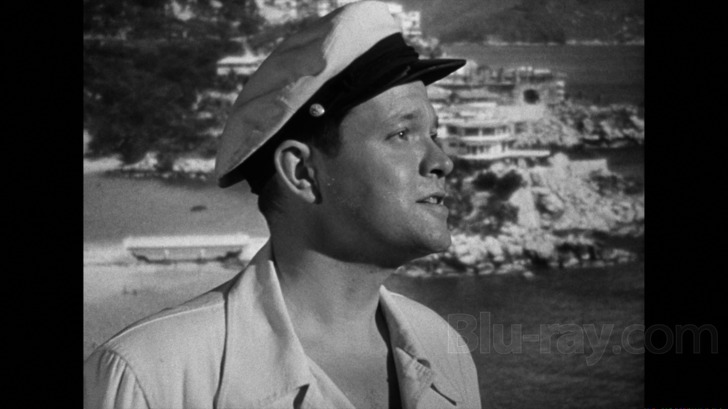
The Lady From Shanghai is presented on Blu-ray courtesy of The TCM Vault Collection (though this is a Sony-
Columbia property) with a VC-1 encoded 1080p transfer in 1.37:1. You all might want to just get out the torches and
pitchforks right now, for I have a feeling my assessment of this transfer may generate its fair share of naysayers. I am, in
a
word, a bit underwhelmed. Why, you may well ask? Well, first of all, this was evidently (or at least reportedly)
sourced
off the original camera negative and given a 4K scan. Second of all, this is, as mentioned above, a Sony-Columbia title, a
studio which under the inspired mentorship of Grover Crisp has proven itself a remarkable (maybe the most
remarkable) curator of its assets catalog, especially with regard to their matriculation into high definition. And so let me
state up front part of my disappointment here is no doubt due to
expectations. Is there anything downright horrible about this transfer? No, and in fact parts of it look great—it
actually is at least marginally
cleaner
than the old DVD release, and it features well modulated gray scale and some impressively deep blacks, as a glance
at
the screenshots accompanying this review will prove. But this simply does not have quite the luster, the sheen,
and especially
the sharpness and clarity that we've come to expect from 4K scans of primary elements held by Columbia. It also has
occasionally problematic
contrast and image depth issues, as well as a slightly variable grain field (beyond understandable issues with opticals).
The fact that this title was "passed off" (for
want of a better term) to The TCM Vault Collection may indicate some inherent issues with the elements, but I'm more
prone
to point to
a
single layer disc and some fairly anemic bitrates (only occasionally ever rising much above 20 Mbps, with only a handful of
moments above 30 Mbps) that may (emphasis
may)
account for at least some of the issues here. (Some have pointed to the ostensibly less effective VC-1 codec, but I'm not
an
AVC elitist; I've seen many great looking transfers encoded via VC-1.) There is absolutely no doubt that some of the
softness and roughness on display is due to the film's reliance on multi-pass opticals; huge swaths of this film feature
literally
minutes
of dissolves and segues, something that will inherently add some problems. But the overall look here, while certainly
generally pleasing and just as certainly a step up from the DVD (especially in terms of damage), is something of a
letdown, at least to me. This is a
matter of degrees, however, and should be tempered by the realization that, yes, I was expecting a knock your socks off
transfer on this title (and unfortunately my socks are still on). There may be many of you who will be perfectly fine, maybe
even excited, by the video quality of this
release. I was just
expecting more. I'll be in the
Frankenstein
Castle awaiting your arrival.
Update: TCM has announced a reissue
of
this title, with an AVC codec and higher bitrates.
The Lady from Shanghai Blu-ray Movie, Audio Quality 
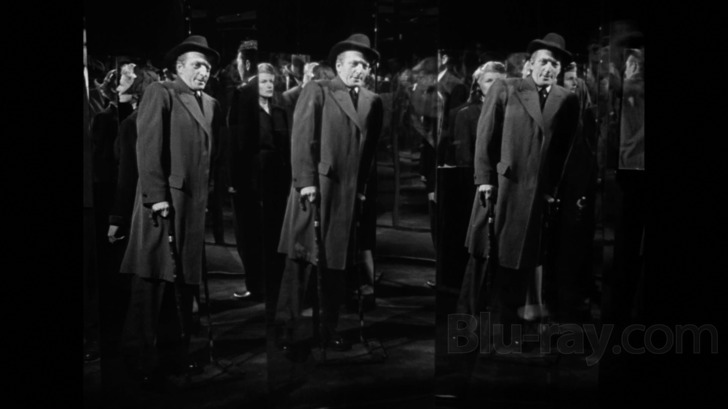
I've reviewed a lot of niche titles through the years by little labels just starting to put out Blu-rays, and seemingly they
inevitably feature Dolby Digital sound mixes, evidently ignoring the fact that Blu-ray consumers tend to be audiophiles as
well as videophiles. The fact that a relatively major release is deemed unworthy of lossless audio may not exactly be
reprehensible, but it's at least questionable, at least in my estimation. But here we have The Lady From Shanghai
presented via Dolby Digital Mono (pumped out over two channels in Dolby Digital 2.0). It's not the deal killer some might
insist, for the film's dialogue is still cleanly presented, and Welles' issues with Heinz Roemheld's music are legendary, so
perhaps less of that score is actually preferable. But it's still a shame that such an iconic film isn't offered in the best
possible way in terms of both audio as well as video.
Note: The reissue contains a Dolby
TrueHD 2.0 mono track.
The Lady from Shanghai Blu-ray Movie, Special Features and Extras 
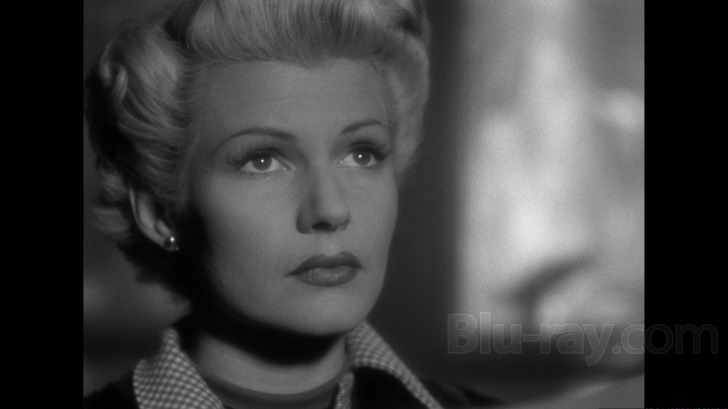
Note: Though it played fine on my newer PS3 with up to date firmware, this disc initially refused to load on either the (older) PS3 I use to take screenshots or on PowerDVD, which I use to determine the resolution of supplements, requesting software/firmware updates on each platform. I was able to get it to load on my older PS3 after updating its firmware, but my PowerDVD is actually completely up to date and yet the disc still refused to load. Therefore, I am unable to absolutely guarantee the resolutions for the supplements, for which I apologize (though considering how quickly they loaded on the PS3 I use to watch Blu-rays, as well as their bitrates, I'm fairly confident they're all 1080i or 1080p). I have an inquiry into Cyberlink asking about this anomaly with PowerDVD.
- Audio Commentary by Peter Bogdanovich. Bogdanovich of course had a long personal relationship with Welles, and calls upon that for this effective and informative commentary. Though he does a killer Welles impression, Bogdanovich doesn't get too "cute" here, tending to quote voluminously from his interviews with Welles, which provide some nice (if perhaps dubious) anecdotes.
- Introduction by Robert Osborne (1080i; 2:37) is culled from Osborne's hosting duties on TCM.
- Publicity Stills (1080p; 6:50)
- Scene Stills (1080p; 5:50)
- Behind the Scenes Photos (1080p; 4:30)
- Movie Posters (1080p; 1:40)
- Lobby Card Set (1080p; 1:30)
- noircast.net Audio Podcast (30:02) is a really interesting evaluation of the film, from the series Out of the Past hosted by Shannon Clute and Richard Edwards.
- TCMDb Article
- Orson Welles Biography
The Lady from Shanghai Blu-ray Movie, Overall Score and Recommendation 
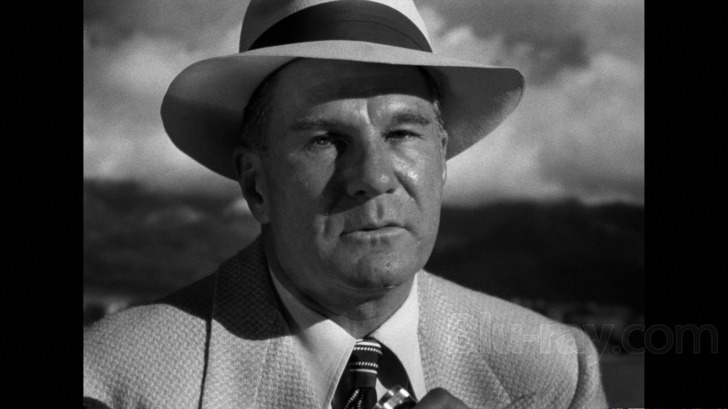
Awe and despair are indeed probably on display in equal measure as one watches The Lady from Shanghai. Welles crafts an incredibly complex (maybe too complex) story that features several of his trademark flourishes, and yet the film also seems oddly constrained and uneven, which I personally attribute to meddlesome higher-ups at Columbia who, as so often happened in Welles' treacherous directing career, thought that they knew "better". Still, the film manages to weave a really hypnotic—indeed, almost hallucinatory—spell that makes it a "must see" for any devoted cineaste. This TCM Vault Collection Blu-ray, like Welles' films themselves, may not be all it might have been, for I personally feel both the video and audio could have been handled more effectively. That said, this is still a worthwhile release that comes Recommended.
Other editions
The Lady from Shanghai: Other Editions

The Lady from Shanghai 4K
1947

The Lady from Shanghai
1947

The Lady from Shanghai
TCM Vault Collection - reissued version
1947

The Lady from Shanghai
1947

The Lady from Shanghai
1947
Similar titles
Similar titles you might also like

Double Indemnity 4K
1944

Witness for the Prosecution
Reissue
1957

The Maltese Falcon 4K
1941

Touch of Evil
1958

Mr. Arkadin
1955

Anatomy of a Murder
1959

Out of the Past
Warner Archive Collection
1947

I Confess
Warner Archive Collection
1953

The Wrong Man
Warner Archive Collection
1956

Fargo 4K
Collector's Edition
1996

Leave Her to Heaven
1945

The Killers
1946

Footsteps in the Fog
1955

The Big Heat 4K
1953

The Third Man
StudioCanal Collection
1949

The Breaking Point
1950

The Long Goodbye
4K Restoration
1973

711 Ocean Drive
1950

The Man Who Wasn't There
2001

Murder, My Sweet
Warner Archive Collection
1944